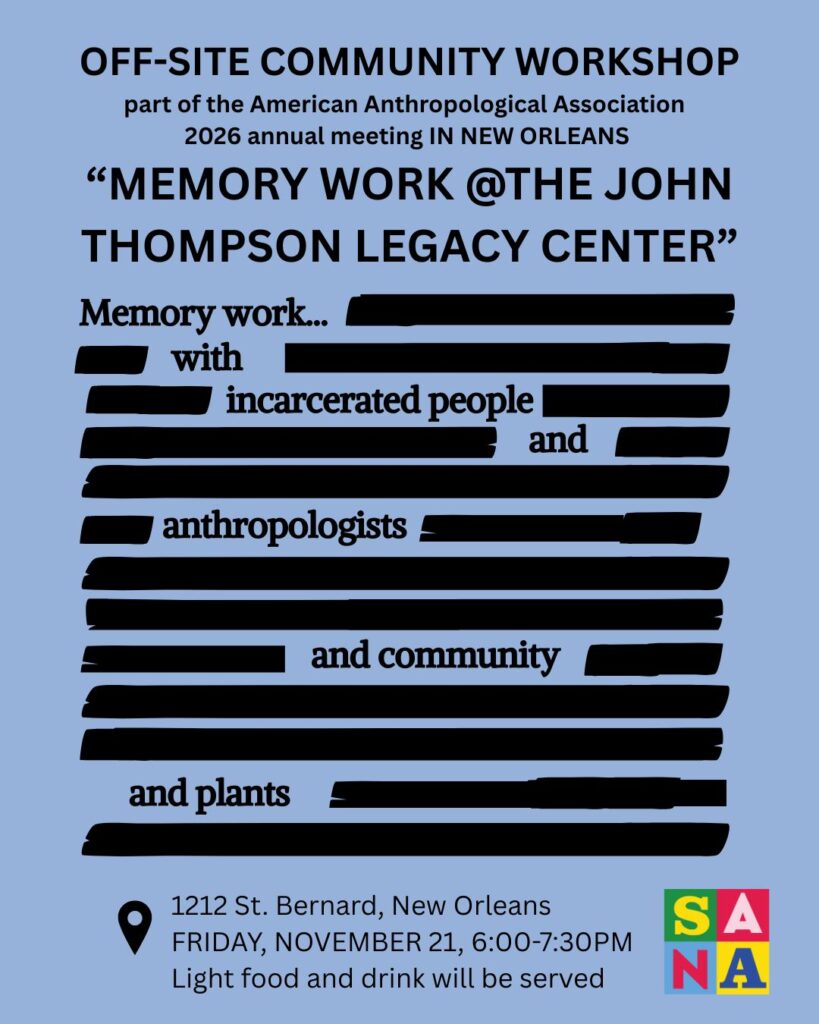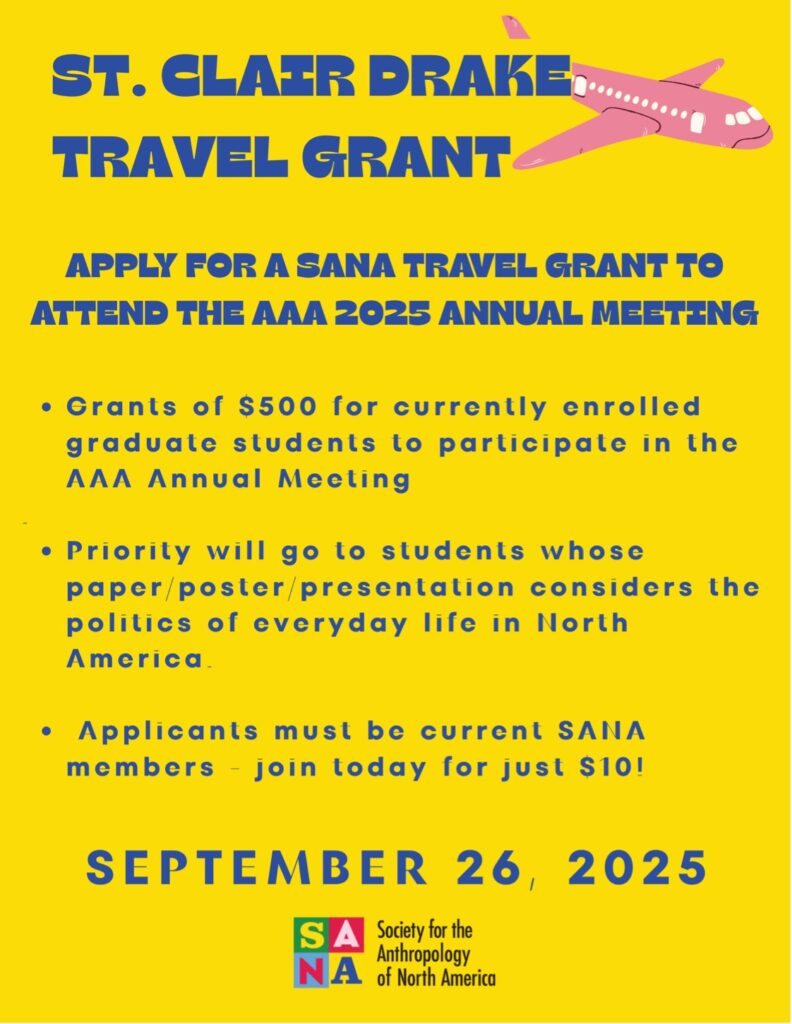Join us for SANA’s Special Events at AAA 2025

Meet the Authors: 2025 SANA Delmos Jones and Jagna Sharff Memorial Book Prize
Friday, November 21, 1:45-2:45
Marriott Studio 5
Come celebrate the winners and honorable mentions of the Society for the Anthropology of North America’s 2025 Delmos Jones and Jagna Sharff Memorial Book Prize! SANA awards this year’s prize to Established Scholar Laurence Ralph for Sito: An American Teenager and the City that Failed Him (Grand Central Publishing, 2024) and to Emerging Scholar Danya Fast for The Best Place: Addiction, Intervention, and Living and Dying Young (Rutgers U. Press, 2024). Honorable Mentions go to Carrie Lane in the Established Scholar category for More Than Pretty Boxes: How the Rise of Professional Organizing Shows Us the Way We Work Isn’t Working (U. Chicago Press, 2024) and to two authors in the Emerging Scholar category: Orisanmi Burton for Tip of the Spear: Black Radicalism, Prison Repression, and the Long Attica Revolt (U. California Press, 2023) and Barbara Sostaita for Sanctuary Everywhere: The Fugitive Sacred in the Sonoran Desert (Duke U. Press, 2024). Learn about the SANA’s selection process for this biannual prize, which considered books published in 2023 and 2024. Join us in celebrating the nominees, hear this year’s winners speak about their books, and bring your copy to have it signed by the author!

Celebrating SANA at 35: Insurgent Anthropologies Then and Now
Friday, November 21, 2:45-4:45
Marriott St. Charles (41st fl)
Thirty-five years ago, right here in New Orleans, near one hundred people crowded into a 1990 AAA Annual Meeting room to demand the creation of a new section that would recognize the existence of an anthropology of North America. Angry and frustrated that their ethnographic research here “at home” was deemed outside the purview of anthropology, limiting their access to grants, publication opportunities, jobs, and professional recognition, they began to organize for change. In 2025, facing challenges both familiar and distinct, a new generation of anthropologists seeks to learn from the strategic efforts of SANA’s past. How have SANA and its sister “insurgent sections” of the AAA shifted the intellectual and political landscape of the association, and of the discipline more broadly? What does SANA’s legacy mean for our next steps and for the future of critical insurgent anthropologies? Join this roundtable of longtime SANA founders and builders Lee D. Baker, Lindsay Bell, Sue Hyatt, Jeff Maskovsky, Ida Susser, and Maria Vesperi to root our ongoing struggles in our shared insurgent foundations.

SANA Graduate Student Social
Friday, November 21, 4:45-6:00
Marriott Hotel Lobby
Following our “Celebrating SANA at 35” roundtable, SANA graduate student representatives Isabel Abarca (UNC-CH) & Nicole Smith (UCLA) will host a graduate student social. This will be a great opportunity to meet fellow SANA student members and consider what we, as junior scholars, imagine for the future of SANA. With the celebration of 35 years of SANA, there is renewed interest in the section’s past and energy for intergenerational relationship-building looking toward the future. A SANA mentorship program is soon to launch and will be informally introduced during this social. We hope you can join us in guiding SANA to more meaningfully engage and support students!

Memory Work @ the John Thompson Legacy Center
Friday, November 21, 6:00-7:30
*Offsite* at the John Thompson Legacy Center, 1212 St. Bernard in the
7th Ward
This SANA + ABA Community Engagement workshop is about ways to protect the memories of people who have survived extreme carceral sentences, and those of their families and friends. We will discuss why memory work is important–and often difficult–and how it can contribute to the histories we share. We’ll explore materials like hard copy photos, handwritten letters, and drawings, and formats like digital images and AV artistic interpretations. Join us at the John Thompson Legacy Center to learn from and be in conversation with leaders from Freedom to Grow and The Visiting Room Project.

SANA Business Meeting
Saturday, November 22, 11:45-1:15
Sheraton Edgewood AB (4th fl)
The Society for the Anthropology of North America encourages all members and friends to attend our annual business meeting. Join us in celebrating Shannon Speed, recipient of the 2025 Prize for Distinguished Achievement in the Critical Study of North America! Additional topics include: SANA publishing futures; Building a SANA mentoring program; Planning the 2027 SANA Spring Meeting in Mexico City; Recognition of awardees and of all who labored this year for SANA; and Inaugurating new leadership. We will also open the floor for other member initiatives and concerns. New and seasoned members, and anyone who is SANA-curious, are welcome!
Older News
Congratulations to SANA’s 2025 Award Recipients
We are delighted to announce the 2025 recipients of the Society for the Anthropology of North America’s awards!
2025 Delmos Jones and Jagna Sharff Memorial Book Prize
2025 Prize for Distinguished Achievement in the Critical Study of North America
Eleanor “Happy” Leacock Travel Grant
Apply for a SANA Travel Grant to Attend the AAA 2025 Annual Meeting
SANA’s travel grants are available for members presenting at the AAA 2025 Annual Meeting, to be held November 19-23 in New Orleans. Submissions are due by September 26. Please see our Travel Grants page for more details!
Spring Meeting 2025
March 25-29, Portland, Oregon
Your SANA Board and Planning Committee have been hard at work planning a fantastic Spring Meeting, to be held in collaboration with the Society for Applied Anthropology!
Learn more at the Spring Meeting 2025 page.
Access the complete SANA Spring Meeting 2025 Program here!
SANA Invites Self-Nominations to the Board
Several SANA board positions are up for election in 2025, including:
President Elect (6-year commitment: 2 as President Elect, 2 as President, 2 as Past President)
Treasurer (2-year commitment)
Secretary (2-year commitment)
Member-At-Large (3-year commitment)
SANA welcomes experienced and new members who have time to dedicate to section governance. Elections will take place in spring 2025, and terms will begin at the close of the 2025 annual AAA meeting. Interested parties are welcome to contact Nominations Committee chair Angela Stuesse (astuesse@unc.edu) with questions and/or nomination materials by by Friday, January 31.
Self-Nomination Materials
Nominee Background Information: Full Name (First & Last) Education (highest degree earned, institution where degree was earned, year degree was earned); Positions Held (limit 5 -most recent first): Title, (dates from-to), Name of Institution; Interests and/or Activities: (Limit 3); Significant Publications: (limit 3 – most recent first): Title, co-authors/editors if applicable, where published, year published.
Platform Statement: The platform statement should be approximately 200 words in length. Statements significantly over 200 words will be cut down to 200 words before publishing.
Seeking a Graduate Student Rep and Social Media Coordinator
The Society for the Anthropology of North America is searching for an anthropology graduate student to join the SANA Board in the role of Social Media Coordinator now through at least May 2026.
Role Overview
In addition to attending SANA board meetings, as a Graduate Student Representative you will serve as SANA’s Social Media Coordinator, playing a lead role in enhancing the visibility of SANA and its publications across various social media platforms. You will develop and execute social media strategies, create engaging content, and interact with our online community. We expect this will take approximately 2-5 hours weekly. This is a fantastic opportunity for someone interested in section governance, academic publishing, social media management, and digital communication.
About Us
SANA (Society for the Anthropology of North America), a section of the American Anthropological Association, aims to provide a focused voice and institutional presence for the anthropology of the United States, Canada, and Mexico. SANA brings together anthropological researchers whose work covers a range of methodologies, topics, and settings to expand understanding of the region’s human histories, contemporary concerns, and imagined futures. A focal point in SANA is the intersections of race, gender, settler colonialism, migration, and class, highlighting efforts toward a more just world.
JANA (Journal for the Anthropology of North America) is the peer-reviewed publication of the Society for the Anthropology of North America and as such is dedicated to advancing research and scholarship in the study of anthropology focusing on Canada, the United States, and Mexico. JANA is a forum for North Americanist scholars, activists, and practitioners to disclose findings, raise issues, describe fieldwork, and offer political and theoretical analyses in a timely fashion.
Also a project of SANA, Home/Field is a space for ethnographers of North America to contend with pressing issues through an anthropological lens, and to explore what anthropology as a discipline — methodology, theory, ethics, and more — can contribute to the imagination and enactment of a more just world. We publish short-form, dialogical, and multi-sensory work that exists in parallel to the long-form scholarly work found in JANA to complement the research articles found in the journal.
Key Responsibilities
-
- Develop and implement a social media strategy tailored to the three platforms’ audience and goals.
- Create, schedule, and publish content across social media platforms (e.g., article highlights, author interviews, academic insights).
- Monitor social media trends and engage with the online academic community.
- Collaborate with the editorial teams to promote new publications, special issues, and events.
- Analyze and report on social media metrics (engagement, reach, impressions) to improve content performance.
- Research and explore new ways to expand the journal’s online presence (hashtags, cross-promotion, partnerships).
- Assist in managing social media interactions, including responding to comments and messages.
Skills and Qualifications
-
- Currently pursuing a graduate degree in Anthropology or a related field.
- Strong interest in academic publishing, research, or related fields.
- Proficiency with social media platforms (Twitter, LinkedIn, Facebook, Instagram).
- Excellent written communication skills, with the ability to adapt to different tones and audiences.
- Creative mindset with an eye for compelling visuals and content design.
- Basic knowledge of social media analytics tools (e.g., Hootsuite, Buffer, Twitter Analytics) is a plus.
- Self-motivated, organized, and able to work independently with minimal supervision.
Perks
-
- Participation in the governance of a section of the American Anthropological Association.
- Hands-on experience in social media management within an academic setting.
- Opportunity to network with leading scholars and researchers.
- Gain insights into the academic publishing process.
- Flexible hours.
- Academic credit or a letter of recommendation upon successful completion of the term.
- All SANA Graduate Student Reps receive $750 annually toward AAA membership, meeting registration, and travel expenses to attend the SANA/AAA meeting.
How to Apply
Please send your resume, a brief cover letter, and examples of any social media work or relevant experience to SANA President Angela Stuesse (astuesse@unc.edu) by October 1, using the subject line “SANA Grad Rep.” In your cover letter, tell us why you’re passionate about social media and academia!
We look forward to hearing from you!
SANA Conference 2025
In 2025 the Society for the Anthropology of North America (SANA) will hold a spring meeting in conjunction with the annual meeting of the Society for Applied Anthropology (SfAA) in Portland, Oregon, from Tuesday, March 25 through Saturday, March 29, 2025, at the Hilton Portland Downtown. SANA is planning an exciting program for our members, and we look forward to reviewing your paper and panel proposals. Stay tuned for more information about SANA’s keynote speakers and special events in Portland.
For more information, click here.
SANA Call for Sessions, AAA 2024
Dear SANA Members,
The General Call for Participation is now open for AAA’s 2024 Annual Meeting in Tampa, November 20-23. Featuring the theme Praxis, this year’s meeting will offer options for both in-person and online. The AAA deadline for proposals to be completed is Friday, April 26, 11:59pm ET.
The Society for the Anthropology of North America (SANA) invites members to use our Communities platform to circulate CFPs and organize sessions relevant to the critical study of North America, broadly speaking. If your SANA membership has lapsed, we invite you to use this opportunity to renew so you can access the conversation on Communities. We also encourage you to select SANA as primary, secondary, or tertiary section for potential sponsorship for your session.
Guided by member interests expressed in SANA’s recent poll about priorities for the 2024 meeting, SANA will prioritize sponsorship of sessions featuring the work of Florida-based anthropologists and activists, as well sessions critically examining the pressing issues facing Florida and North America today.
Warmly,
Shalini Shankar and Katharina Rynkiewich
SANA Representatives, AAA 2024 Program Committee
Call for Papers – Journal for the Anthropology of North America (JANA)
Palestine as Exception, Palestine As Norm: Critical Perspectives on Gaza from North America
The ongoing siege on Gaza has become a flashpoint for and a test of the convictions, analysis, and solidarity of social justice movements in North America. Racial justice, immigration, Indigenous, environmental, and LGBTQIATS spaces are being forced to confront the inextricable connections between their movements and Palestinians’ plight, as well as the risks that accompany steadfast public manifestations of solidarity against empire. The genocide in Palestine, ‘Ghassa’ The Lump in One’s Throat, requires us to interrogate how conditions within the imperial core are structured and maintained through war and invasion. This volume lays bare the intended and unintended aftereffects of framing the ongoing terror against Palestinians as “exceptional.” Palestine instead is a nexus that showcases the interlocking violent foundations of settler colonies that gift, sell, and loan killing technologies and the expertise to maximize their lethal effects. Recipients of these technologies in turn test, prototype, and export new modes of racialized subjection and dispossession. Even as the U.S and other so-called superpowers funnel these technologies and knowledge throughout the world, they pursue the building of militarized border walls to protect domestic interests (largely by keeping residents of the Global South out of or vulnerable to exploitation in the North). These terror exports and fortress architectures illuminate how settler colonies rely on and naturalize one another. They also expose the limits of liberal humanitarian logics – including progressive-to-radical proximity to the U.S. Democratic Party – in contexts of settler colonial violence.
This special issue on North America and its ties to the ongoing siege of Gaza will showcase alternative horizons for political struggle. We seek research articles, book and film reviews, poems, ethnographically-based commentary/ reflections, and other creative works that draw out the linkages between Palestine and other struggles produced by and waged within territories across Turtle Island and Anahuac. Areas of interest include but are not limited to:
- The forms, practices, and aftereffects of the U.S.’s and other so-called “superpowers’’”tentacles of their empires (McGranahan, Collins 2018)
- How Palestine exposes the limits of liberal humanitarianism and scrambles other assumptions about the solidity of liberal principles in US and Canada
- The revisiting of theories of prisons, surveillance, and the carceral state as they apply to and are challenged by Palestine
- The inter/nationalism (Salaita 2016) of Palestinian and North American Indigenous sovereignty movements. And, networks of global settler solidarity and settler communities
- The environmental impacts of settler colonial economies and warfare, and the lifeworlds built in landscapes of war and invasion (Masco 2017, Spice 2018)
- The impact on Palestinian-American Diaspora Politics and connections to Palestine on North American electoral politics
- The mundane and the spectacular in the violence of occupation/ siege
- Thinking through Palestine as exception and Palestine as norm
- Linkages between various state-sponsored conflicts, genocides, militarized borders, as well as between various “industrial complexes” such as the academy, military, and prisons
- The complicity of North American Anthropology in forms of liberal empire and settler colonialism (c.f. Price 2016, Simpson 2017)
- Palestine, anti-Zionism, and the state of leftist commitments to internationalism in North America
- Settlements, border towns, and other modes of settler place-making
Please send 200-250 word abstracts to the Editorial Collective (Elizabeth Rubio, Xitlalli Alvarez Almendariz, and Denise Brennan) at anthronorthamerica@gmail.com by January 26th, 2024. Given the urgency of the ongoing violence, we plan to produce this issue faster than usual. By early February we will reach out to selected authors to submit their contributions for peer review. The deadline for these contributions is April 30th and revised – final – versions are due to the journal by July 31.
Congrats to our 2023 Travel Awards and Book Award winners! You can read about the book award winner more in depth on our SANA Book Award page.
St. Clair Drake Student Travel Awards:
-
- Tannya Islas, UC Irvine, “Borderfields: Agriculture and Migrant Experiences of Climate Change Across the US and Mexico”
- Madison Aubrey, UCLA, “Identity and Resistance in the Material Culture of Black Mobile
Eleanor “Happy” Leacock Travel Awards:
-
- Erika Finestone, Post-doc, University of Victoria, “Bureaucracy in Indigenous Children’s Lives”
SANA 2023 Book Award
-
- Winner:
- Elizabeth Farfán-Santos, Undocumented Motherhood: Conversations on Love, Trauma, and Border Crossing
- Honorable Mentions:
- Thurka Sangaramoorthy, Landscapes of Care: Immigration and Health in Rural America
- David Boarder Giles, A Mass Conspiracy to Feed People: Food Not Bombs and the World-Class Waste of Global Cities
- Lucas Bessire, Running Out: In Search of Water on the High Plains
- Winner:
From the President, July 2023
Greetings to our SANA membership! Welcome to our updated website and many thanks to our webmaster, Ryan Logan, for his work on this project. I am pleased to be serving this short interval as the interim president of SANA. By a vote of the SANA Board, I was asked to serve as interim president of the section when the previous president was compelled to step down due to personal and professional pressures. I took up this role this past January and will continue until the next meeting of the AAA in November in Toronto, when Angela Stuesse will take over. Also as of November, our next president-elect is Ana Croegaert. Thank you to these two extraordinary scholars and activists for their service to the section and for their support to me as I navigate the current challenges facing SANA and the AAA more broadly.
These are challenging and parlous times in North America and there has never been a more pressing time for SANA…
(Read the full message from our interim president, Dr. Sue. Hyatt here).
Middle East Section (MES) of the American Anthropological Association Statement on Palestine
MES Statement on Palestine, updated 5.21.21
We stand in solidarity with the Palestinian people against ongoing settler colonialism and condemn Zionist violence against them, including forced evictions and retaliatory violence by Israeli state forces against Palestinians in the Occupied West Bank, East Jerusalem, Gaza, and within the state of Israel. We condemn the recent forced evictions of Palestinian families in the Sheikh Jarrah neighborhood of East Jerusalem–part of a now decades long campaign of ethnic cleansing of Jerusalem– and Israeli violence perpetrated against families trying to defend their homes.
In October 2014, nearly 1200 anthropologists signed “Anthropologists for the Boycott of Israeli Academic Institutions” to support the global campaign for Boycott, Divestment and Sanctions. On November 20, 2015, a resolution to boycott Israeli academic institutions was endorsed by a vote of 1040-136 at the American Anthropological Association business meeting. It was subsequently forwarded to the full membership for an electronic ballot and narrowly missed adoption by a razor-thin margin of 39 votes (2,423 against and 2,384 for).
Seven years later, on April 27, 2021, Human Rights Watch issued a landmark report, characterizing the Israeli state’s systemic discrimination and violence as inflicting “deprivations… so severe that they amount to the crimes against humanity of apartheid and persecution.” A similar conclusion was reached by the Israeli Human Rights organization B’tselem in January 2021. Palestinian activists have long made this argument. It reflects how foregone the reality of the Israeli Apartheid system is that mainstream international human rights organizations now find themselves forced to acknowledge the reality of the situation on the ground, despite tremendous political pressure from the state of Israel and its supporters.
We reject the “two-sides” narrative that ignores the differences between one of the most heavily militarized states in the world and a Palestinian population resisting their oppressors. This is a state which continues to displace, dispossess, and murder those living under its illegal occupation, based in ongoing settler colonialism, and a system of ethnic, religious, and racial apartheid. Palestinian resistance to this violent system of occupation and apartheid is a legal right.
As members of a U.S. professional organization that continues to grapple with systemic racism and inequality in our field and our practices, we condemn settler colonialism, ethnic cleansing, and racial capitalism that connect the United States and Israel. We stand with those working to dismantle these systems of oppression, and we amplify their calls for justice, equality, and human dignity.
Israel’s policies of closure, land confiscation, house demolitions and dispossession of Palestinians, unlawful arrest, injury and killing of Palestinian civilians have continued unabated since AAA last took up this issue. We call on our colleagues in their classrooms, universities, and beyond to:
- Reject the “two-sides” narrative that erases power hierarchies.
- Recognize the framework of apartheid as applicable to describe Israel’s systematic repression of Palestinians in Gaza, the West Bank, and within Israel’s 1948 boundaries.
- Recognize that Israel’s violent repression often constitutes crimes against humanity.
- Reject the International Holocaust Remembrance Alliance (IHRA) definition of anti-Semitism which has been used by Israel’s supporters to suppress legitimate criticism of Israel.[1]
Sincerely,
MES Executive Board
Endorsed by the Following AAA Sections:
Association of Black Anthropologists Executive Board
Association of Latina/o & Latinx Anthropologists Executive Board
Society for Cultural Anthropology Executive Board
Association for Political and Legal Anthropology Executive Board
Society for the Anthropology of North America Executive Board
Anthropology and the Environment Executive Board
Society for Urban, National, and Transnational/Global Anthropology Executive Board
The Society for Latin American and Caribbean Anthropology Executive Board
American Ethnological Society Executive Board
Society for the Anthropology of Europe Executive Board
Society for Medical Anthropology Executive Board
Editorial Collective at American Anthropologist
Endorsed by the Following Anthropology Departments:
Anthropology Department of American University
[1] An alternative is presented by the Independent Jewish Voice of Canada that defines antisemitism AND does not suppress criticism of Israel: https://www.ijvcanada.org/jerusalem-declaration/
Anthropologists Call on the Biden Administration to Cease the Separation of Im/migrant Families and the Detention of Children
Within the first three months of 2021, 33,000 unaccompanied children arrived at the United States-Mexico border. The U.S. Department of Health and Human Services (HHS) responded by opening large-scale facilities, ranging from 1000 to 4500 beds, to house them. Yet most of these children did not travel alone; they were rendered “unaccompanied” by Title 42, a Centers for Disease Control and Prevention (CDC) policy enacted by the Trump administration that instructs US Customs and Border Patrol (CBP) to refuse entry to adults from a country where a communicable disease is present. Unlike adults, children from noncontiguous countries cannot be deported immediately.
Instead, minors are being detained in converted convention centers, stadiums, and military bases until they are reunited with family in the U.S., enter federal foster care, or are deported. These unlicensed influx and intake sites expose children and youth to severe physical and psychological trauma. Moreover, they reflect the broader criminalization of im/migrant populations in the United States, contributing to political frameworks that undermine the rights of children and families and leave them vulnerable to abuse and surveillance by state actors.
SANA joins the Anthropologist Action Network for Immigrants and Refugees (AANIR) to urge the Biden administration to cease separating im/migrant families through the use of Title 42 and to ease the myriad restrictions constraining individuals’ right to seek asylum., including the detention of children.
Title 42 is not an aberration; rather, it builds upon earlier policies of both the Obama and Trump administrations that have restricted asylum, including the “Remain in Mexico” program and the illegal asylum metering system at the US-Mexico border. Here, we draw on our expertise as anthropologists to historicize family separation and to argue for immediate action to defend the human rights of im/migrants and refugees. We specifically call for the end of administrative policies that render children unaccompanied and the abolition of the detention of migrant children in all forms.
Historicizing child-family separation
Title 42 is merely one among myriad ways in which immigration policy is separating children from their families– be it raids, stalled family reunification, visa quotas, or deportation. States have long employed this practice as a social, economic, and political strategy. Examples include the forced separation of Native American children in so-called “Indian schools”; the use of children in chattel slavery and subsequent fracturing of enslaved families; and the ways that Nazi concentration camps, Japanese internment camps, and the Argentine military during the dirty war—all used child separation and/or the threat of separation as tools of intimidation and repression. Additionally we can point to the ongoing hyperpolicing and mass incarceration of African Americans that separates families and displaces Black youth into the foster system. These examples serve as a reminder that child-family separation has long been used as a technique of political statecraft.
Forced family separation has both immediate and long-term effects. Anthropological research in general, and Indigenous scholarship in particular, understands trauma not merely as an individual response to an event, but also as a rupture of the social fabric. The consequences of this rupture are at once individual, social, collective, and enduring, necessitating an approach to violence against children that accounts for its function as a form of social violence that is explicitly transmitted across generations. For example, we see the reverberations of chattel slavery in contemporary experiences of trauma and disparate health outcomes of African American women. We are just beginning to understand and rectify the consequences of the Trump-era zero-tolerance policies that forcibly separated 5500 children from their families. However, historical precedent indicates that the implications of this action will be extensive and long-lasting. Notably the Pomona Fairplex influx facility for unaccompanied children is the very site where Japanese Americans were interned during World War II. Without a sharp course correction, the Biden administration is in danger of repeating harmful policies of removing young people from their families and networks of care, augmenting the trauma they experience.
Consequences of child detention and separation
The most recent iteration of child-family separation instigated by Title 42 poses serious consequences for the young people currently housed in HHS facilities. Experts concur that even brief detention and separation from parents can cause psychological trauma and induce long-term mental health risks for children and youth. Medical anthropologists have identified how experiences of prolonged detention negatively impact migrants’ mental and physical health and further contribute to increased vulnerability to COVID-19. These impacts are particularly dire for children. Research underscores that care practices (or lack thereof) in large-scale institutions can cause severe harm: Children who have been detained describe constant surveillance, limited communication with family, lack of fresh air and green space, prohibition against physical touch, and disturbingly, overmedication. They are also victims of sexual assault, physical abuse, verbal abuse, and medical neglect. At the same time, children struggle to cope with the uncertainty of family reunification, procedural opacity, ongoing legal proceedings, and the possibility of deportation. Children’s case files, including mental health records, behavioral notes, and communications presumed to be confidential, can and have been used against children in immigration court.
Recognition of the inadequacy of institutional care for child development and wellbeing has precipitated a shift away from institutional-based care for non-migrant children. Indeed, the federal government has codified that children in the domestic child welfare system should be placed in the least restrictive setting appropriate to their needs, prioritizing family and small group care. Yet, federal facilities for migrant children continue to grow in size. Detention centers writ large have come under heavy scrutiny from academics, politicians, and journalists. Meanwhile, privately contracted facilities like the Homestead Temporary Influx Facility in Florida—previously run by Caliburn, a Department of Defense contractor — have also been shown to be potentially harmful for the physical and developmental health and wellbeing of children and youth. Despite the dangers they pose, these facilities operate on a profit motive and benefit from government contracts. The continued development of large-scale detention facilities, in spite of clear evidence of the dangers they pose, is emblematic of what researchers have termed the “immigration industrial complex” whereby public and private power converge to expand systems of detention and surveillance. Detention centers are generally placed out of view with difficult accessibility, making it difficult to ensure accountability and augmenting the need for a critical anthropological presence in and around facilities.
Despite constraints on the immediate deportation of children and youth from noncontiguous countries, hundreds of thousands of removal orders and voluntary departures effectuated on young people have increased deportations dramatically since 2013 and expanded the effects of coercive confinement and expulsion across time and space. Experiences of return may exacerbate vulnerabilities in countries of birth and have emotional, social, and material impacts. Not only may the often incomprehensible legal processes that lead to deportation be disorienting, but arrival is likewise distressing. Removal to unfamiliar deportation sites can generate anxiety that is compounded by the feeling that mobility and out-of-placeness itself may intensify difficulties securing adequate places to stay, being in contact with loved ones, and avoiding violent victimization. Moreover, for many people who are returned, physical and social distance from family in the United States is extended, amplifying the effects of separation over time, both within and outside of U.S. territory.
Call to Action
We call upon the Administration to rectify the situation at the United States’ southern border by implementing a three-part approach that is monitored by independent experts and follows best practices in each:
- Uphold and defend the basic human rights of asylum-seeking families at the border without ever separating adults from children, especially when they are under U.S. custody. This includes adhering to international refugee conventions and protocols and related international law protecting the rights of children and migrants and regarding racial, gender, and other forms of discrimination. This also includes ending internationally-condemned CBP practices such as abusive screening using “hieleras” or iceboxes, destruction of migrant water supplies, and illegal turning away or refoulement of asylum-seekers.
- End administrative policies that produce unaccompanied child migration. Specifically, we call for a repeal of Title 42 which continues to separate children from their families, stopping the illegal asylum metering at U.S.-Mexico border checkpoints, and halting any remaining use of “Safe Country Agreements” to El Salvador, Guatemala, Honduras, and Canada.
- Quickly reunify all detained children with family members and close all detention facilities (private and nonprofit) for unaccompanied children, including facilities run by Customs and Border Patrol, Immigration and Customs Enforcement, and HHS’s Office of Refugee Resettlement. The Biden administration must follow best practices in the placement and care of young migrants, including the placement of children in the least restrictive setting appropriate to their needs, prioritizing family and small group care. Children should live in family-based settings where the federal government provides legal representation and culturally- and linguistically-appropriate services, including mental health and educational support.
The Biden administration must acknowledge the historical, political, economic, and ecological factors forcing a new generation of young people to leave Central America, and the United States’ role in this history of displacement. Instead of policies that further militarize migration management across the Americas, the Administration must address the multifaceted causes of migration in ways that center the voices, experiences, and challenges of displaced and vulnerable communities in Central America, Mexico, and the US.
This statement was prepared in collaboration with the Anthropologist Action Network for Immigrants and Refugees and is endorsed by the Society for the Anthropology of North America, the Council on Anthropology and Education, and the Anthropology of Children and Youth Interest Group. An abbreviated version was issued by the American Anthropological Association.
Spring Forward
Dear SANA members,
I hope everyone is having a good Spring and weathering the end of the academic year. Before summer activities begin, I want to remind all of you to VOTE in the AAA elections, including for the SANA Board. Elections are open until May 31st. Also, please consider submitting a session or a volunteered paper for the annual meetings in November. The meetings will be hybrid, so if you cannot travel, you can still participate! We are hoping for a robust SANA presence this year.
I want to thank all those who tuned in to the SANA BEATS programs throughout the month of April. The programs were lively, engaging and showcased cutting edge research and activism that is the hallmark of our section. A huge shout-out goes to the program organizing committee, Ana Croegaert (leader), Ryan Logan, Elizabeth Hanna Rubio, and Kanan Mehta. Ana also created the SANA BEATS playlist which gave the program a unique flavor! Thank you also to Ruth Gomberg Muñoz for the program design and all-around support! Thank you also to all the panelists and workshop leaders. If you were not able to tune in, you will have the opportunity in the near future to listen to selected recordings of the programs.
Finally, I am thrilled to promote the newly launched Home/Field website associated with our Journal of North American Anthropology. JANA editors Megan Raschig and David Flood and their team have created this new site for dialogues, author engagements and audio-visual essays (https://www.homefieldanthro.org/). The next issue of JANA will be out soon as well!
Stay safe, stay strong!
Alaka Wali
President
A Heartbreaking Loss
It is with deep sorrow that I write to inform SANA members of the passing of Professor Leith Mullings. Leith made her transition on December 13th after a brief illness. Many will speak and write of Leith’s considerable accomplishments and groundbreaking work in the days and weeks ahead. We will all find ways to honor her. Here, I just want to speak personally about her generosity and compassion from which I and so many others benefitted. Once she committed to a person or a cause, she never wavered in her support. Leith introduced me to anthropology in North America and the deep richness of experience that working at home can bring. She was not only a great theoretical mind on intersecting forms of stratification and the centrality of race in the United States of America, but also a committed activist working for transformative social change. I know many of you will feel as I do that SANA would not be SANA without her contributions to our field and our homeland. The Board is developing ways to honor Leith and all ideas are welcome. We will keep everyone posted as plans for wider memorials are formed.
Alaka Wali
President of SANA
A Statement from SANA
We at SANA condemn the recent murders of George Floyd, Breonna Taylor, Ahmaud Arbery, Tony McDade and countless others by racist police or their deputies. BLACK LIVES MATTER, and we find inspiration in the collective outrage against these incidents and in public protests for justice. As anthropologists working in North America, many of us have documented the systematic ways in which policing has been used to deliberately harm and oppress Black and other communities of color.
We further condemn in the strongest possible terms the structural racism that has contributed to the devaluation of Black, Latinx, and Native American lives in North America, resulting in their disproportionate mortality from diseases including COVID-19.
We join our fellow anthropological sections, as well as our community leaders, in challenging the foundational anti-Black nature of police agencies. We demand the dissolution of ICE and other institutions that perpetuate racist laws and practices. We support the efforts of organizations such as the Movement for Black Lives, Campaign Zero and Color of Change and others to end police brutality and empower communities to take control of their own safety and well-being. We further demand that governments at every level invest sustained effort and resources to redress 500 years of subjugation of Black, Latinx, and Native people across the North American continent.
We unequivocally support the efforts of community organizers as they mobilize to effect social change. We further pledge to put our research, resources, and scholarship in service to community-led movements for racial justice.
SANA Statement on U.S. Immigration Practices
The Society for the Anthropology of North America (SANA) condemns in the strongest possible terms recent actions taken against migrants by the current administration. In particular, we call for a permanent moratorium on the practice of separating children from parents on the U.S.-Mexico border, and we demand that children and their families be reunited and released from U.S. detention facilities into the U.S. interior. We further demand that the administration end criminalization of migrants, recognize asylum claims based on threats of gender-based and organized violence, and, in general, treat asylum seekers and all migrants with dignity, care, and respect. Moreover, we call on the administration to acknowledge and address long-standing U.S. policies that have contributed to the erosion of safety and stability in migrants’ home societies across Latin America and the world. As a society with members who have expertise on human mobility across the North American continent, as well as on state-sponsored violence against migrants and others who are socially and legally devalued, we emphatically reject the racist, xenophobic, and patriarchal ideologies and policies advanced by this administration and others before it.






